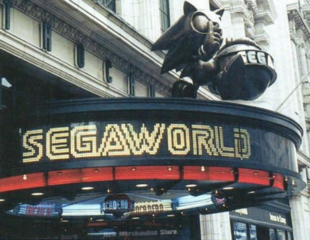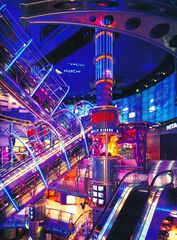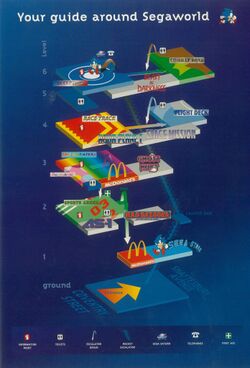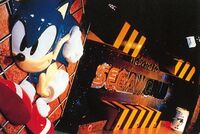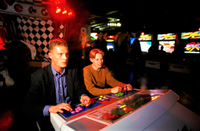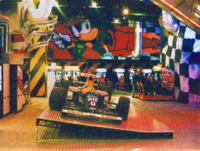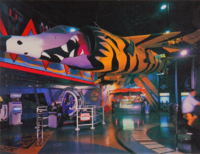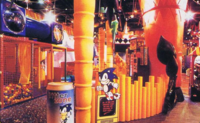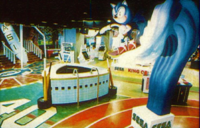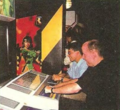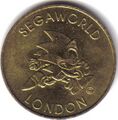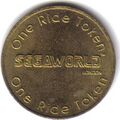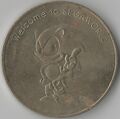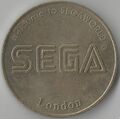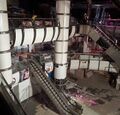Difference between revisions of "SegaWorld London"
From Sega Retro
(Found out that Funland had two Bars... the "Bar at 4" was actually what became "Le Bar", although I don't know if that moved after the downsize. Once again, this is just speculation.) |
m |
||
| Line 10: | Line 10: | ||
| closed=1999-09-07{{ref|https://www.thisismoney.co.uk/money/news/article-1577337/Chorions-Segaworld-game-over.html}} | | closed=1999-09-07{{ref|https://www.thisismoney.co.uk/money/news/article-1577337/Chorions-Segaworld-game-over.html}} | ||
}} | }} | ||
| − | '''SegaWorld London''' was a [[Sega World]] indoor | + | '''SegaWorld London''' was a [[Sega World]] indoor [[Amusement Theme Park]] opened by [[Sega]]. Housed within the London Trocadero complex, the site became the flagship Sega amusement centre in Europe upon opening in September 1996, and was the first theme park venue to be opened outside of Japan by the company. |
It was claimed to be the largest indoor theme park in the world, occupying an area of 10200m² on seven floors{{intref|Press release: 1996-09-12: INTERNATIONAL MANAGER : Sega Tests the Theme-Park Route}} and making it the largest venue to be developed and wholly ran by Sega, but has since closed permanently. Parts of the park were ran as an unrelated amusement arcade into the early 2010s. | It was claimed to be the largest indoor theme park in the world, occupying an area of 10200m² on seven floors{{intref|Press release: 1996-09-12: INTERNATIONAL MANAGER : Sega Tests the Theme-Park Route}} and making it the largest venue to be developed and wholly ran by Sega, but has since closed permanently. Parts of the park were ran as an unrelated amusement arcade into the early 2010s. | ||
Revision as of 10:54, 21 August 2023
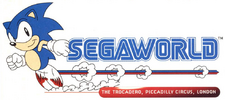
|
| SegaWorld London |
|---|
| Location: The Trocadero, Piccadilly Circus London, United Kingdom |
| Google maps: 51.510490,-0.133022 |
| Opened: 1996-09-07[1] |
| Closed: 1999-09-07[2] |
SegaWorld London was a Sega World indoor Amusement Theme Park opened by Sega. Housed within the London Trocadero complex, the site became the flagship Sega amusement centre in Europe upon opening in September 1996, and was the first theme park venue to be opened outside of Japan by the company.
It was claimed to be the largest indoor theme park in the world, occupying an area of 10200m² on seven floors[3] and making it the largest venue to be developed and wholly ran by Sega, but has since closed permanently. Parts of the park were ran as an unrelated amusement arcade into the early 2010s.
Contents
Layout
Taking up over 100,000 of the Trocadero's 600,000 square feet, SegaWorld London was a seven-floor indoor amusement theme park. Whilst billed as such, much of its floor space was taken up by its large amount of coin-operated arcade machines, including full-size deluxe iterations of games and imported versions scarcely seen elsewhere in the UK. Alongside numerous other Sega venues, it was specifically used for the location testing of both upcoming and never-released titles, as well as holding occasional officially-organised events.
After entering the Trocadero building through its shopping arcade area, visitors would be taken up the "rocket escalator", (16.43m in length (with 80m of handrail), 31.5 tons in weight and 193 steps[4] (although it was technically two escalators, not one)), running through the main atrium containing other Trocadero tenants, to the sixth "level" (floor). This acted as the park's reception, with each subsequent floor based around differing themes and concepts. The arcade machines on these floors were generally kept in line with the designated theming, and various other attractions and amenities could be found between them, including a McDonald's restaurant and other refreshment stalls.
The subsequent floors themselves were connected and accessible to visitors by working their way down a further series of escalators and travelators, frequently situated on the left and right sides at the top of the Trocadero's main atrium area, as well as several static staircases. Also originally located in the atrium was the official Sega Shop, which sold merchandise exclusive to the park and small quantities of other consumer products created by Sega. Alongside a second McDonalds outlet directly opposite it, the retail unit that housed the shop was positioned to the left of the bottom of the exit escalator, until the shop's later upstairs relocation to the Sports Arena.
Following Sega's removal from the facility, portions of the floors were redesigned extensively.
| Reception | |
|---|---|
| At the reception, visitors could obtain tokens and attraction tickets, have photos taken with statues of Sonic the Hedgehog (the de-facto mascot of the park), and try a selection of free to play Sega Saturn consoles. Also housed on the floor was an interactive information centre, video screens displaying promotional films, and the first attraction, Beast In Darkness, with its exit leading out onto the following floor. | |
| Combat Zone | |
| The Combat Zone floor was more akin to a dimly-lit conventional amusement arcade, featuring black and yellow striped décor and no attractions. Its space was instead devoted to a selection of over 50 action games, with genres ranging from fighting to shooting. At launch, games included Virtua Cop 2 and Fighting Vipers, as well as non-Sega titles like Time Crisis and Area 51. | |
| Race Track | |
| Boasting extensive theming, with replicas of race cars in its walls and giant traffic lights, the Race Track featured over 70 racing games, most notably back to back 8 player deluxe setups of Daytona USA and Manx TT Superbike with live commentators. The floor's attraction, officially known as Aqua Nova at previous Sega amusement theme parks, was renamed and localised under the name of Aqua Planet.
One of Damon Hill's FW15C racing cars from the 1993 Formula One season was also situated on the floor for photo opportunities. During that season, Hill drove with Alain Prost for Williams, who were famously sponsored by Sega at the time. Incidentally, Prost partly owned the La Tête Dans Les Nuages entertainment centre chain in France, whose Paris and Amiens locations contained Centre Sega amusement arcades. In 1999, a cocktail bar, known as "Bar on 4", opened up on this floor. | |
| Flight Deck | |
| Themed around aviation and aircraft, the Flight Deck level housed 20 "flying" games, taking in titles such as Sky Target and Wing War, as well as Namco's Prop Cycle. At one point in time, both Dennou Senki Net Merc and G-LOC: Air Battle R360 machines were located on the floor, the former of which was originally stationed in the Combat Zone at launch.
Promoted as one the venue's premier attractions, much of the Flight Deck's space was taken up by VR-1: Space Mission. Hanging from the floor's ceiling was the first commercially available ex-RAF Harrier Jump Jet, transported to the venue in the months prior to its by being towed through London on a boat for a PR event and subsequently reported on by Computer & Video Games magazine.[5] | |
| Carnival | |
| The Carnival, a brightly lit area with décor loosely based on the Sonic the Hedgehog games, contained over 80 arcade machines, most typically UFO Catchers and prize redemption. A prize desk to reward ticket payouts accommodated these. Also located on the floor was the "Segakids" section, featuring a McDonalds outlet and indoor play equipment for young children.
Initially, only one attraction was installed on the floor within the park's opening: Ghost Hunters (localised and adapted under the name of Ghost Hunt). This number would later increase to three with the additions of the small House of Grandish 3D sound room attraction developed by Human in late 1996 and the Power Sled simulator after 1997. In 1999, a Dodgems track (referred to as "London's Fastest Dodgems" on the 1999 leaflet) was added. | |
| Sports Arena | |
| The final floor, Sports Arena, housed over 90 sports games. These included Sega-made examples such as Virtua Striker and Sega Bass Fishing, as well as the more unconventional SegaSonic the Hedgehog and Sonic the Fighters cabinets at one stage. On opening day, Virtua Fighter 3's official UK launch occurred on the level.
The floor housed two attractions, Mad Bazooka and a pair of AS-1 motion simulators. Mad Bazooka was closed and removed around 1998, and is possible that the Sega Shop (which moved to this floor from the exit escalator at around the same time) moved into the space. |
History
- Main article: SegaWorld London/History.
Attractions
Videos
- 3D concept model by 3D modeller John Robertson
- 2Vandaag report, 1996
- Micro Kid's coverage, 1996
- Escape report, 1996
- GamesMaster coverage, 1996
- Scene from Italian film Cucciolo shot at SegaWorld London, 1998
Gallery
Post SegaWorld
Merchandise
Magazine articles
- Main article: SegaWorld London/Magazine articles.
Promotional material
Sizzle reel for the centre circa early 1996
External links
- SegaWorld London homepage (archived)
References
- ↑ File:CVG UK Freeplay 07.pdf, page 1
- ↑ https://www.thisismoney.co.uk/money/news/article-1577337/Chorions-Segaworld-game-over.html
- ↑ Press release: 1996-09-12: INTERNATIONAL MANAGER : Sega Tests the Theme-Park Route
- ↑ Computer & Video Games, "June 1996" (UK; 1996-05-09), page 57
- ↑ Computer & Video Games, "August 1996" (UK; 1996-07-11), page 8
| Sega-related venues in the United Kingdom |
|---|
| Sega World |
| Bournemouth (1993-2000) | London (1996-1999) | Tamworth (199x-xxxx) | Wolverhampton (199x-xxxx) | Birmingham (199x-xxxx) |
| Sega Park |
| Glasgow (1993-200x) | Acton (1994-199x) | Colindale (1994-2008) | Southampton (1996-2013) | Wood Green (199x-xxxx) | Basildon (199x-2005) | Reading (199x-199x) | Bristol (199x-200x) | Harlow (1997-2003) | Tower Hill (xxxx-200x) | Harrow (200x-200x) | Holborn (200x-200x) | Brighton (2002-2006) |
| Sega Zone |
| Brixton (199x-xxxx) | Catford (199x-xxxx) | Woolwich (199x-xxxx) |
| Sega Megaworld |
| Croydon (199x-199x) | Harrow (199x-199x) | Romford (199x-199x) |
| Sega Prize Zone |
| West Midlands (2015-2020) | Southport (2016-2019) | Hatfield (2016-2020) |
| Others |
| Metropolis (1992-199x) | Planet Sega Queensway (199x-200x) |
